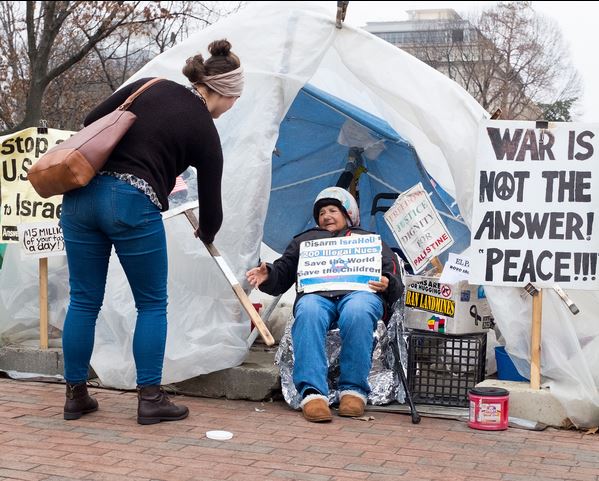Tidbits - January 28, 2016 - The Richest 62; Noam Chomsky Says; Trump; Woody Guthrie; Threat of a Free Haiti; Segregation in Schooling - Today; announcements and more...
- Re: Noam Chomsky Says GOP Is 'Literally A Serious Danger To Human Survival' (Mary Ann Bohlke; Esl Nola; Larry Aaronson; Mary Fusoni)
- Re: AFSCME President: Members Organizing For Clinton To Lift Wages For All (Thomas Scott Tucker; Brian Obrien)
- Re: Obama's Speech and the Collapse of a Peace Presidency (Seymour Joseph)
- Re: Donald Trump, Ross Perot, George Wallace: The Impact of Demagogues (Puffin Room)
- Re: What Woody Guthrie Wrote About 'Old Man Trump': His Racist Landlord (Kathe Karlson; Jan Clarke Brassil; Stephanie Garrett;Thomas Karlson)
- Re: Environmental Racism Harms Americans in Flint - And Beyond (Heather Cottin)
- Re: Inside the Government's Racial Bias Case Against Donald Trump's Company, and How He Fought It (Judyth Hollub)
- Re: The Threat of a Free Haiti (George Lessard; Larry; Lorraine Suarez Davis)
- Re: Richard Levins: The People's Scientist (East Side Freedom Library)
- Re: Chavismo and Its Discontents (Lincoln Smith: T.M. Scruggs)
- Re: 'Trumbo' and the Hidden Story of the Red Scare (James Young)
- Re: Contingent (Adjunct) Higher Education Faculty (Joe Berry)
- La lucha contínua (Luís Torres)
- Challenging Corporate Globalisation - An Online Course for Trade Unionists Around the World (Eric Lee)
- Spring Break Delegation to Bolivia, Food Sovereignty, and Indigenous Resistance! (Alberto Lovera Bolivarian Circle of NY)
- We have lost one of the indispensable ones - Concepcion Picciotto. Presente!
- The Narrative Of School Failure And Why We Must Pay Attention To Segregation In Educational Policy (Albert Shanker Institute)
- Double Book Launch in Los Angeles with Author Gerald Horne
Chomsky advised 2016 voters to cast their ballots strategically. He said the U.S. is essentially "one-party" system -- a business party with factions called Republicans and Democrats. But, he said, there are small differences between the factions that can make a "huge difference in systems of enormous power" -- like that afforded to the president.
Mary Ann Bohlke
Posted on Portside's Facebook page
====
in the long run, i believe that it is a seriously flawed and dangerous strategy to 'vote for the lesser evil'. this kind of pragmatic thinking got the dronemaster-in-chief in office. many of his victims would not consider this non-republican less evil than even trump. chomsky is off here, as he is in several other areas, including 9/11, and why should anyone follow his advice like a sheeple anyway? the ONLY conscionable electoral strategy in this, or any other election is BOYCOTTING. when enough sheeple wtfu and actively begin the process of deligitimizing this rigged, oligarchical-directed, scam, then the process of rebuilding or reinventing a democratic government can proceed, but not before. continuing to vote is only prolonging the inevitable- revolution, or ensuring the continued capitalistic descent into the abyss.
Esl Nola
Posted on Portside's Facebook page
====
I know your position. Chomsky expresses MY position on voting. In my view TOO many people will be severely damaged even more if a repub gets in. And those people are the most vulnerable amongst us. I don't buy the bringing on the revolution faster argument for that reason as well as I don't see now nor have I seen recently a viable revolutionary movement. Occupy excited me but had serious flaws. BLM is great. But I feel sure the election will happen before grows to what it needs to be to bring intersection systemic change.
Mary Ann Bohlke
Posted on Portside's Facebook page
====
Noam Chomsky warns that the GOP candidates platforms are putting the nation in grave peril. Fair enough. He argue that it is important to vote strategically, e.g. vote Hillary who is most likely to win DNC nomination and with our votes the presidency. Wait a second there prof Chomsky....
You have no argument with me about the perils of GOP politics.
You have no quarrel with me that both parties are part of the one percent of the one per cent elites,
You have no argument with me that Senator Sanders' politics are far more to the point, honest, accessible and acceptable than Hillary's
BUT the solution to the crisis in our electoral politics is NOT more progressive politicians who accept the present ruling class system of capitalism as the only and the inevitable
Apparently you reject socialism??? even democratic (liberal) socialism????
Perhaps not in your life time, or my lifetime...
But a grass roots movement evolving towards socialist solutions is definitely in the making....
I'm surprised you do not address the inevitability of that grass roots movement.
Larry Aaronson
Posted on Portside's Facebook page
====
I'm with him too. Basically it's the "making the perfect the enemy of the good" argument, but with the stakes extremely, catastrophically high should a Republican president be elected. Let us think on what a different world we'd be living in now, in terms of war and climate change at least, if Al Gore had assumed the presidency in 2000. I would love to believe that Bernie's grassroots movement would prevail if he should win the nomination, but then I remember McGovern in 1972 .... For me, in this year, delectability (that is, who can keep a Republican from the White House) is the ONLY real issue.
Mary Fusoni
Posted on Portside's Facebook page
Not surprised by AFSCME leaders endorsing Clinton. The "pragmatic" wing of the labor movement becomes a strong arm of management when it joins the Clintonista wing of the Democratic Party.
Thomas Scott Tucker
====
But did anyone ask the members? In AFT we did not get to vote.
Brian Obrien
Posted on Portside's Facebook page
Near of end of Ackerman's column he mentions putting "Obama's legacy in context." Well, what's sorely missing from his column is context. You would think from reading it that Obama's presidency was merely a continuation of Bush's. Please! Where's the context of all that Obama faced - domestically, politically and internationally? In context, he and his administration did remarkably well, wrestling with intransigent Republicans, a lousy economy and a Middle East quagmire. With whatever shortcomings there were, and whatever questions we may have in re drone warfare, Obama deserves a better assessment than Ackerman gives him - even of his final State of the Union speech.
Seymour Joseph
You should study history - Eugene Debs was a 5 time 3rd party candidate and Teddy Roosevelt ran as an independent on the Moose Party in 1912 and finished 2nd
Puffin Room
Like father, like son- those racist Trumps!
"For Guthrie, Fred Trump came to personify all the viciousness of the racist codes that continued to put decent housing - both public and private - out of reach for so many of his fellow citizens:
I suppose
Old Man Trump knows
Just how much
Racial Hate
he stirred up
In the bloodpot of human hearts
When he drawed
That color line
Here at his
Eighteen hundred family project ....
Kathe Karlson
Posted on Portside's Facebook page
====
We must continue to know our history, thank you. Hate to think what Donald Trump would do to this country and the world as President. Thank you Woody Guthrie and the folks who saved his songs.
Jan Clarke Brassil
Posted on Portside's Facebook page
====
I was reading this yesterday; another apple falling close to the tree.
Stephanie Garrett
Posted on Portside's Facebook page
====
grandfather pimp father racist landlord son allaround sob children big game hunting bastards
Thomas Karlson
Posted on Portside's Facebook page
I first learned of Environmental Racism from the people in North Carolina whose water ( and air) are destroyed by the huge hog farms providing our bacon..
Heather Cottin
Posted on Portside's Facebook page
Per Doris Kearns Goodwin's article (elsewhere on Facebook) about the media falling down on their job, the media should now plaster all media outlets with articles like this one revealing Trump's past and present business practices, including employee treatment. Trump's always saying he employs dozens or hundreds of Hispanics-- but in what capacities and for what kind of wages in comparison with non-ethnic employees? I've not seen any research into that...have I missed it?
Judyth Hollub
Posted on Portside's Facebook page
In 1791, while France entered the early stages of its revolution, the slaves of its Caribbean colony, Saint Domingue, rose up and took arms. It was the first successful slave revolt in history, one that overthrew white colonial rule and established the new state of Haiti in 1804.
The Haitian Revolution sent shivers through European possessions across the Caribbean and Latin America, and into the newly independent United States. It became a tremendous symbol of hope for slaves throughout these countries, and one of tremulous fear for their masters, particularly those living in the colonies. Its effects extended to the South American independence movement led by Sim¢n Bol¡var, and to France, particularly during the more radical periods of its own revolution.
In Freedom's Mirror: Cuba and Haiti in the Age of Revolution, historian Ada Ferrer undertakes a comprehensive evaluation of the impact made by the Haitian Revolution on Cuba, then still a Spanish colony located only fifty miles from Haiti's western sea borders.
George Lessard
Posted on Portside's Facebook page
====
Ada Ferrer's new book "The Freedom's Mirror: Cuba and Haiti in the Age of Revolution" adds whole chapters documenting the effect of the African slaves' overthrow of French imperial rule in Haiti, the crown jewel of European imperialism in the Caribbean. The only "successful" rebellion by African slaves in all of the America's sent shock waves most especially to the neighboring island where Spanish and English colonialists' enslaved labor yielded extraordinary wealth cultivating cash crops, sugar, tobacco and later coffee.
Ferrer's history book focuses mainly on the Cuban struggle between slaves, free Blacks and planters. In many cases the successful slave rebellion was an economic disaster for Haitians but paradoxically was an economic boom for slavers in Cuba. All the more reason Cuban slave owners had to devise all manner of counter-revolutionary measures to prevent insurrection on their island. Conversely liberated Haitian slaveshoped to both protect their own victories and African slaves in Cuba devised ways to plot revolution in Cuba. As such this is the history of revolution and counter-revolution in 19th century Caribbean history which has huge implications for the continued exploitation of Haitians and the struggle of Cubans to protect and preserve their 20th century communist revolution.
Larry
Posted on Portside's Facebook page
====
as I am sure you know, many of the slaves in Cuba were brought over by our Southern owners who took their plantation business to the island. Thanks for sharing. I am going to get the book,
Lorraine Suarez Davis
Posted on Portside's Facebook page
Hamba kahle, Richard Levins. East Side Freedom Library hails the important work he did, always in a politically informed and principled way. We send our love and solidarity to his children, Ricardo and Aurora Levins Morales and his grandchildren Manny and Olivia. What an amazing family!
Posted on Portside's Facebook page
God save us from Social Democrats masquerading as intellectual "Marxists". Any one who denies the hand of U.S. imperialism in Venezuela either blind to history or in the pay of AID and the U.S. government. I submit that the rush to increase oil production in the U.S. by fracking, thus driving down international prices was directly aimed at disrupting the economies of Venezuela, Iran, Russia and others on the hit list of the U.S. State Department.
Lincoln Smith
====
Thank you for getting this out, I was going to suggest it.
In solidarity,
T.M. Scruggs
Executive Producer
James DiEugenio exposes much about the Red Scare motives and methods of the post-World War II era. My own research demonstrates that efforts to revive the first Red Scare date from the early 1930s, and Kathryn Olmsted's splendid Right Out of California (New Press, 2015) shows how the movement developed fully in that state, originating with the opposition of agribusiness growers and their allies to the leftist-led farm-workers' union and New Deal liberals who seemed to support them. The California Right then created the model for (all contrary rhetoric aside) big-government New Conservatism by merging economic conservatism with cultural traditionalism and sold it to an expanding audience throughout the US over the following decades. Sad to say, it's still very much with us.
James Young
I am happy to "like" and to invite all readers of Portside to subscribe to the news aggregator, COCAL UPDATES, that I do for contingent (adjunct) higher education faculty activists and their allies, where I often include Portside pieces. Email me at joeberry@igc.org to subscribe for free.
Joe Berry
Posted on Portside's Facebook page
Portside Brothers and Sisters,
Glad the contributions (even small ones such as mine) have kept you afloat. Please keep doing what you do. Personally, I just hope the Koch brothers and their ilk don't spend a pinch of their zillions of evil dollars to hack you out of existence. Reasonable readers benefit from what you do -- and we just can't have you blown out of the water. Watch your (technological) back and stay on course.
Luís Torres
You are invited to join the online course entitled "Workers' Rights in a Global Economy" which starts on 3 March 2016.
This is a Massive Open Online Course (MOOC), offered as cost-free and as a certificate course, by the Global Labour University. It aims to connect union members and labour activists around the world.
Learn and debate about strategies for implementing workers' rights nationally and along global supply chains.
Click here to learn more and sign up.

Please spread the word in your unions.
Thanks very much.
Eric Lee

The Plurinational State of Bolivia is the first country in the hemisphere governed by a progressive indigenous leader. Learn about indigenous struggles for sovereignty over food, land, and water. Gain an understanding of the spiritual and philosophical foundations of Pachamama. And discover the traditional ecological knowledge of the country's indigenous peoples. Meet with farmers, community leaders, government officials, and others. Experience the rich culture of the Andes and soak in the sights, sounds, people, and politics at this historic moment in Bolivia.
When: March 17 - 27, 2016
Where: Start in Santa Cruz and end in Santa Cruz; visits to Cahapare, Cochabamba, Oruro, La Paz.
Cost for Activities: $1000. This will cover all lodging, all ground transportation, at least 2 meals per day, and translation. Additional expenses during the trip will be minimal. *Airfare not included. Possible group rate available for those traveling from NYC.
Anyone interested should email cbalbertolovera@gmail.com as soon as possible, as space for this trip is very limited. Please allow a day or two for responses.
Sponsored by the Alberto Lovera Bolivarian Circle of NY.
Additional flight ticket of $50 will be required for an internal flight from La Paz to Santa Cruz.
About an earlier trip: Bolivia: Complexity and Inspiration at the Roof of the World
There are men who struggle for a day and they are good.
There are men who struggle for a year and they are better.
There are men who struggle many years, and they are better still.
But there are those who struggle all their lives: These are the indispensable ones.
-- Bertolt Brecht
Concepcion Picciotto, the protester who maintained a peace vigil outside the White House for more than three decades -- a demonstration widely considered to be the longest-running act of political protest in U.S. history -- died Jan. 25
Read more here.

Concepcion Picciotto in a recent picture
January 28, 2016
Our guest authors today are Kara S. Finnigan, Associate Professor at the Warner School of Education of the University of Rochester, and Jennifer Jellison Holme, Associate Professor at the University of Texas at Austin. Finnigan and Holme have published several articles and briefs on the issue of school integration including articles in press in Teachers College Record and Educational Law and Policy Review as well as a research brief for the National Coalition on School Diversity. This is the first of a two-part blog series on this topic.
Imagine that you wake up one morning with a dull pain in your tooth. You take ibuprofen, apply an ice pack, and try to continue as if things are normal. But as the pain continues to grow over the next few days, you realize that deep down there is a problem - and you are reminded of this every so often when you bite down and feel a shooting pain. Eventually, you can't take it any longer and get an x-ray at the dentist's office, only to find out that what was originally a small problem has spread throughout the whole tooth and you need a root canal. Now you wish you hadn't waited so long.
Why are we talking about a root canal in a blog post about education? As we thought about how to convey the way we see the situation with low-performing schools, this analogy seemed to capture our point. Most of us can relate to what happens when we overlook a problem with our teeth, and yet we don't pay attention to what can happen when we overlook the underlying problems that affect educational systems.
In this blog post, we argue that school segregation by race and poverty is one of the underlying causes of school failure, and that it has been largely overlooked in federal and state educational policy in recent decades.
Wednesday, February 3rd -- 7 PM
4327 Degnan Blvd
Los Angeles, CA 90009
Featuring: Gerald Horne's 'Paul Robeson: The Artist as Revolutionary', London: Pluto, 2016 and 'Confronting Black Jacobins: The U.S.,, the Haitian Revolution and the Origins of the Dominican Republic', New York: Monthly Review Press, 2016.
Co-sponsor: Sojourner Truth @ kpfk radio, LA


Spread the word